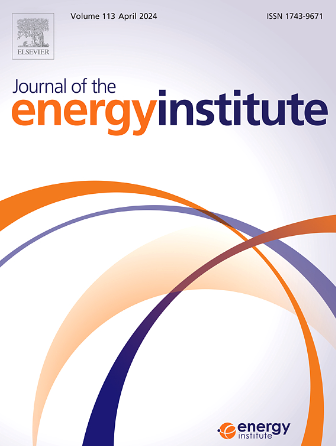对氢气生产技术和氢燃料内燃机的性能、燃烧和排放进行了全面的综述
IF 6.2
2区 工程技术
Q2 ENERGY & FUELS
引用次数: 0
摘要
随着全球气候变化的加剧和化石燃料储量的枯竭,能源转型已成为一项紧迫而重大的全球性挑战。氢燃料因其无碳排放和高能量密度而受到重视,被视为未来清洁能源系统的基石。本研究首先建立了必要的制氢技术,强调可再生途径是最可持续的途径。现有的研究很少对层流燃烧速度等氢燃烧的基本理论进行系统的解释。因此,本文对这些基本理论进行了详细的分析,并强调了它们在优化内燃机性能方面的关键作用。考虑到氢喷射策略对燃烧稳定性和效率的直接影响,从而决定了功率输出、燃油经济性和排放,我们全面评估了喷射参数(角度、正时、喷油器几何形状和喷射模式)对发动机性能的影响。此外,本文还回顾了在缓解异常燃烧(如逆火和爆震)和减少氮氧化物排放方面的最新进展,重点介绍了涉及缸内热点和喷射动力学的复杂触发机制,以及现象之间的交叉触发效应。最后,在现有文献的基础上,总结了当前的研究趋势,并提出了未来可能的研究方向。本文章由计算机程序翻译,如有差异,请以英文原文为准。
A comprehensive review of hydrogen production technology and the performance, combustion, and emissions of hydrogen-fueled internal combustion engines
With the intensification of global climate change and the depletion of fossil fuel reserves, the energy transition has become an urgent and significant global challenge. Hydrogen fuel, valued for its carbon-free emissions and high energy density, is regarded as a cornerstone of future clean energy systems. This study first establishes prerequisite hydrogen production technologies, emphasizing renewable pathways as the most sustainable approach. Existing research has seldom provided systematic explanations of fundamental hydrogen combustion theories, such as laminar burning velocity. Therefore, this paper offers a detailed analysis of these fundamental theories and emphasizes their critical role in optimizing internal combustion engine performance. Given the direct influence of hydrogen injection strategies on combustion stability and efficiency—thereby dictating power output, fuel economy, and emissions—we comprehensively evaluate the effects of injection parameters (angle, timing, injector geometry, and injection mode) on engine behavior. Furthermore, recent advancements in mitigating abnormal combustion (e.g., backfire and knocking) and reducing nitrogen oxide emissions are critically reviewed, highlighting complex triggering mechanisms involving in-cylinder hotspots and injection dynamics, as well as cross-triggering effects between phenomena. Finally, based on the existing literature, this paper summarizes current research trends and suggests potential future research directions.
求助全文
通过发布文献求助,成功后即可免费获取论文全文。
去求助
来源期刊

Journal of The Energy Institute
工程技术-能源与燃料
CiteScore
10.60
自引率
5.30%
发文量
166
审稿时长
16 days
期刊介绍:
The Journal of the Energy Institute provides peer reviewed coverage of original high quality research on energy, engineering and technology.The coverage is broad and the main areas of interest include:
Combustion engineering and associated technologies; process heating; power generation; engines and propulsion; emissions and environmental pollution control; clean coal technologies; carbon abatement technologies
Emissions and environmental pollution control; safety and hazards;
Clean coal technologies; carbon abatement technologies, including carbon capture and storage, CCS;
Petroleum engineering and fuel quality, including storage and transport
Alternative energy sources; biomass utilisation and biomass conversion technologies; energy from waste, incineration and recycling
Energy conversion, energy recovery and energy efficiency; space heating, fuel cells, heat pumps and cooling systems
Energy storage
The journal''s coverage reflects changes in energy technology that result from the transition to more efficient energy production and end use together with reduced carbon emission.
 求助内容:
求助内容: 应助结果提醒方式:
应助结果提醒方式:


